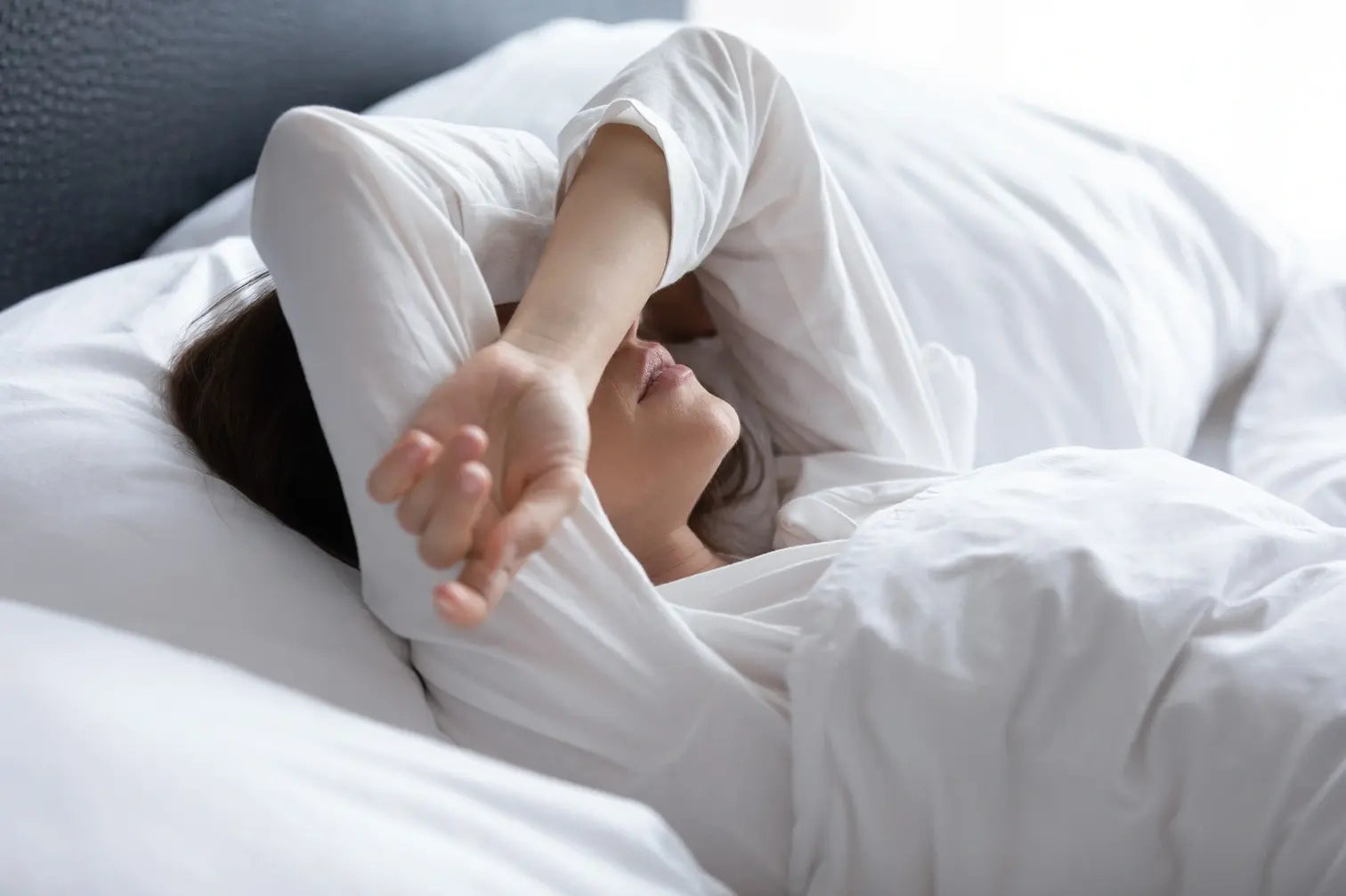What does lack of sleep do to skin?
Effects of sleep deprivation on your skin
Accelerated aging
The combination of internal threats like free radicals and external threats like sun damage cause collagen within the skin to break down. Collagen gives the skin its strength to protect against external sources of damage. Without adequate sleep, your body struggles to repair damaged collagen.3 This manifests in the form of fine lines, wrinkles, and sagging skin.
Skin Inflammation
Sleep-deprived individuals will experience heightened levels of stress hormones (l.e. cortisol) within the body. Stress hormones are known to trigger the release of inflammatory agents. This has a stream of impacts, including the following:
-
Puffiness: Inflammation
causes cells in and around the skin to swell with fluid. This protective measure results in puffy eyes and an irritated skin appearance. 4 To learn more aboutwhy lack of sleep causes dark circles, explore our comprehensive guide.
- Acne-prone skin: The bacterial forms of acne are associated with skin inflammation that can be worsened by lack of sleep.
-
Skin disease:
Inflammation is correlated to many skin diseases like Psoriasis and Eczema that affect the health of the skin.4,5 Although not necessarily the main culprit, these skin problems can be worsened by sleep deprivation.
Skin texture
Because lack of sleep increases skin inflammation, it can exacerbate dull skin, acne, dark spots, eczema, and scarring. In addition, sleep deprivation reduces collagen levels in the skin, weakening your skin barrier.6 This leads to a dehydrated, rough skin texture and increased pore size. (Read more about optimizing skin texture here to learn more about how to smooth skin texture here)
How to restore sleep debt
Having a perfect sleep schedule is admirable, but we all have the occasional unavoidably late night. Consistently accumulating a “sleep debt” can have long-term consequences for your skin and overall health. Taking on sleep debt is natural yet can easily be avoided by listening to your body and making up for the lost hours.
Nighttime skin care routines
- Gentle Cleansing: Cleansing your face removes makeup, dirt, and pollutants. Choose a gentle cleanser that won't strip your skin of its natural oils. Consider OneSkins PREP, a gentle daily facial cleanser that thoroughly removes impurities, light makeup, and sunscreen without disrupting the skin’s natural balance.
- Moisturize: Appling a hydrating moisturizer nourishes and locks in moisture. This keeps your skin healthy and radiant throughout the night and into the next day. This is especially important for dry skin types.
- Use Serums and Treatments: Consider incorporating serums containing safe ingredients that can combat the aging effects of skin. In lab studies, OneSkin’s OS-01 proprietary peptide has been shown to stimulate collagen production pathways and target cellular damage in the skin. (8) OS-01 FACE, OS-01 EYE, and OS-01 BODY, provide safe and effective ways to turn back the clock in your skin. Read more about integrating OneSkin’s Topical Supplements into your skin routine hereto learn more about how to incorporate os 01 topical supplements in your routine!
Tips for better sleep
-
Prioritize a Consistent Sleep Schedule:
Establishing a regular sleep routine helps regulate your body's internal clock.9
- Naps: Short power naps (20-30 minutes) can be useful for alleviating immediate sleep debt. Avoid napping too close to bedtime to prevent interference with your circadian rhythm.
- Create a Relaxing Sleep Environment: Ensure your bedroom is dark, quiet, and cool, and invest in a comfortable mattress and pillows.
-
Avoid Blue Light Close to Bedtime:
Looking at blue light inhibits melatonin release and keeps you awake. This affects both the quantity and quality of your sleep.10
- Both the quantity and quality of sleep are crucial for overall health and appearance. A good night's sleep can rejuvenate the skin and minimize signs of aging.
- Sleep deprivation accelerates aging, damaging vital proteins like collagen and elastin by releasing free radicals.
- Lack of sleep heightens stress hormones, triggering inflammatory agents that cause puffiness and acne-prone skin and may worsen skin diseases like Psoriasis and Eczema.
- Consistently accumulating sleep debt can have long-term consequences for skin and overall health. Make up for these lost hours by listening to your body.
- Prioritizing a consistent sleep schedule, incorporating short power naps, creating a relaxing sleep environment, and avoiding blue light close to bedtime can significantly improve overall skin health by enhancing sleep quality.



